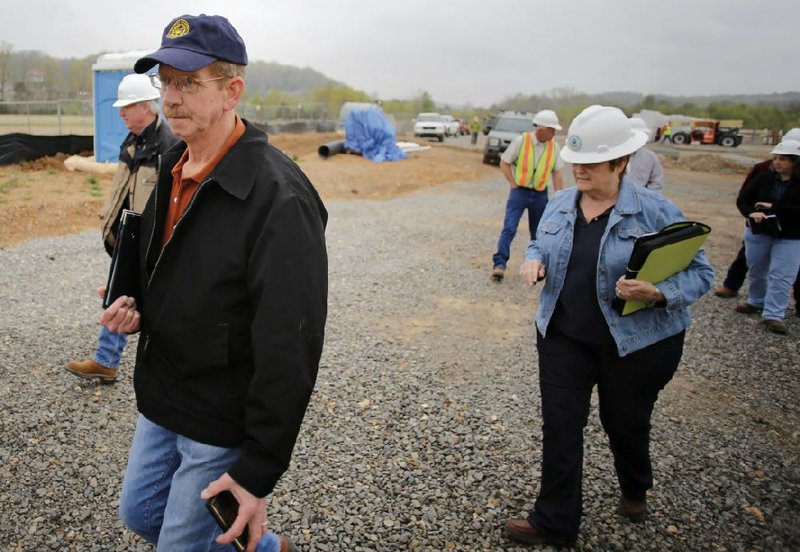BELLA VISTA - Code enforcement officers with the Environmental Protection Agency are providing some on-the-job enforcement training this week in Northwest Arkansas.
Inspectors Diana McDonald and Everett Spencer, who are attached to the EPA’s Region 6 office in Dallas, are looking at storm-water runoff management practices at sites operating under National Pollutant Discharge Elimination System permits. The permits, authorized under the federal Clean Water Act, are administered by individual state agencies such as the Arkansas Department of Environmental Quality.
There are more than 2,700 active storm-water permits throughout the state, according to the department - 843 for construction sites and 1,928 for industrial sites.
The inspectors traveled to the Northwest Arkansas area at the request of municipal leaders who wanted to provide additional training to local inspectors and code enforcement officers, said Jennah Durrant, spokesman for the EPA’s regional office.
McDonald and Everett were accompanied Tuesday morning by inspectors from Lowell, Bentonville and Bella Vista, as well as Washington County Extension Agent Katie Teague.
The inspections began Tuesday morning when McDonald, Everett and the local inspectors arrived at the construction site for the new Mercy Health Center in Bella Vista.
Rinkey Singh, planning division manager for Benton County, observed the EPA inspectors at the hospital construction site and several other sites Tuesday morning.
Singh said inspectors first look to make sure a contractor has posted the appropriate permits for a work site, including notices of intent and coverage and a pollution-prevention plan. Inspectors then check for the proper physical barriers to help contain pollutants, including silt fences that keep sediment from sliding into waterways and ramps that keep vehicles from tracking dirt from the construction site onto public right-of-ways.
“The EPA looks for [Best Management Practices] for sediment and erosion control on site,” Singh said. “It was a good opportunity for us to see what they were looking for, so when we’re on site, we know what to emphasize to contractors in our area.”
Sediment - soil that has been dislodged from the ground during construction or other processes - is one of the main impediments to water flow in natural streams and other bodies of surface water, said Thomas Soerens, associate professor of civil engineering at the University of Arkansas at Fayetteville.
“It impacts streams, and not for the better,” Soerens said.
When a stream becomes clouded with sediment, a lack of light and oxygen can choke out its life.
The inspectors began with a list of about 20 construction sites they planned to inspect between Tuesday and today.Most of the sites are in the municipalities between Bella Vista and Fayetteville, with an additional site in rural Madison County.
The inspectors will give special attention to “MS4” areas - Municipal Separate Storm Sewer Systems, the classification for the string of municipalities around Interstate 540 from Bella Vista to Fayetteville. As urban areas develop, more of their earth is covered with asphalt and other artificial surfaces that aren’t water-permeable. That leads to concentrated flows of storm water, which if not properly contained and decontaminated can carry pollutants into waterways that may be used for drinking water.
Teague, who leads the Washington County extension office’s education initiatives, said storm-water runoff is a problem with more than just construction sites.
“Any land use activity where you’re introducing pollutants into the environment, anything the earth doesn’t absorb, it’s going downhill into a stream at some point,” Teague said.
Teague, who conducted about 200 training and education sessions on storm water in Benton and Washington counties in 2012 according to the extension office’s year end report, said that individual homeowners should also be aware of their contributions to storm-water runoff - lawn fertilizers and grass clippings that end up in sewer drains.
“Our goal is to minimize finger-pointing between the two segments of society,” said Teague, referring to homeowners and the construction industry. “We’re all in this together.”
“We all have to deal with urbanization and growth to protect our water sources,” Singh said. “Growth is inevitable, but we have to manage it in the best way.”
Northwest Arkansas, Pages 7 on 04/18/2013

